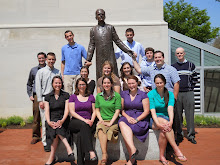Sunday, May 10, 2015
Learning Motherhood From Mary
Time for the Family
5/10/2015
EMacke
,
Gift
,
Holy Family
,
Motherhood
,
Parenting
,
St. John Paul II
No comments
:
It probably shouldn’t be so shocking to me that our toddler daughter is interested in books. After all, nearly every wall in our small apartment is lined with bookshelves. We have daily read-aloud sessions, and if she hears a line or two from a particular book that I recite from memory, she trots across the room looking to retrieve it.
One such line that has come to mind as we begin the month of May, dedicated to mothers, and in a particular way to the Blessed Mother, is from a little board book about saints. “Mary teaches us about loving mothers,” the book declares, with a picture of Mary being crowned by a smiling angel.
The words aren’t just for children. This month is a fitting time to reflect on what the Blessed Mother can teach all mothers about how to love the children entrusted to us.
At first glance it can seem overwhelming to look to Mary – a woman without sin – to grow in our own mothering. We look around at piles of dirty dishes, smell another diaper in need of changing, take a glance at the quickly filling calendar and figure that the Blessed Mother – a perfect woman raising a perfect Son – has so little in common with our 21st century American lifestyle that we’re better off looking elsewhere for guidance.
But as we reflect on the mysteries of the Rosary, there are many life lessons we can learn from Mary. We see, too, that her life was not a blissful ride on easy street. Sure, there are no mysteries centered on smelly diapers or work-life balance, but the graces present in Mary’s life can help us to embrace the struggles and joys of our own family life. Let’s take a look at a couple of lessons of motherhood we glimpse in the fifth sorrowful mystery, Jesus Dies on the Cross.
It’s tempting to think that Mary knew exactly what would happen at every moment of her and her Son’s life. We sometimes have an image of Mary giving her “yes” to Gabriel at the annunciation, knowing exactly what that “yes” would mean. In reality, the archangel did not hand Mary a 33-year calendar to inform her of the everyday “yesses” her fiat to becoming the Mother of God entailed. St. John Paul II, for example, wrote that Mary’s yes to God at the foot of the cross was perhaps the “deepest kenosis (self-emptying) of faith.” Standing at the foot of the cross, she did not know how God would be victorious through the death of her Son, but she knew and trusted that good would come from evil.
 |
| Pieta, Michelangelo - artwork in the public domain |
There are many crosses in motherhood – miscarriages, children who are sick or bullied or ostracized, teenage or adult children who leave the faith, and so many more. Yet, with Mary, every mother is called to have faith that God’s love will pour forth even amidst the most painful situations. There is no resurrection without the cross, and Mary reminds us to trust God’s plan.
There is another poignant lesson for mothers from the crucifixion subtly portrayed in Michelangelo’s “Pieta.” Most viewers of the statue focus on Mary’s arms embracing her Son, but a closer look also reveals her left hand open in an act of surrender. Mary reveals the art – and perhaps the biggest challenge – of motherhood: to embrace and to be detached.
On the one hand, a mother is called to love, cherish and care for the child(ren) entrusted to her. At the same time, these children are not ultimately hers, nor her husband’s. Ultimately, each child is a gift from God. Mothers must care without being possessive. Mothers can look to Mary as an example and as an intercessor in striking this delicate balance.
In his encyclical, Redemptoris Mater, St. John Paul II summarized the way in which the Blessed Mother reveals the call of all women:
It can be said that women, by looking to Mary, find in her the secret of living their femininity with dignity and of achieving their own true advancement. In the light of Mary, the Church sees in the face of women the reflection of a beauty which mirrors the loftiest sentiments of which the human heart is capable: the self-offering totality of love; the strength that is capable of bearing the greatest sorrows; limitless fidelity and tireless devotion to work; the ability to combine penetrating intuition with words of support and encouragement (#46).
At first glance it might seem that only women with biological or adoptive children have something to learn from the motherhood of Mary, but St. John Paul II would challenge us to think differently. All women, by virtue of their femininity, are called to be mothers. All women are called to be spiritual mothers whether or not any children call them, “Mom.”
The human person is entrusted to women in a unique way. It’s not that men do not love or care for people, but rather that women are able, in a particular way, to notice the needs of others and to meet them, offering empathy, a listening ear and the unique care that a particular person needs. Men and women both love, but they love differently. Women love as mothers.
Whether joyful, sorrowful, luminous or glorious, the mysteries of the rosary offer us a glimpse into how Mary loved and lived as a mother, becoming both guide and intercessor for us as we seek to more fully love as a spiritual or physical mother.
Subscribe to:
Post Comments
(
Atom
)
















No comments :
Post a Comment
We would love to hear from you! Please keep comments respectful and relevant to the topic at hand.